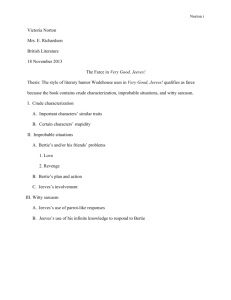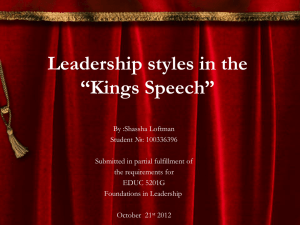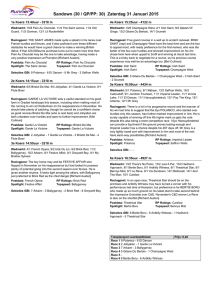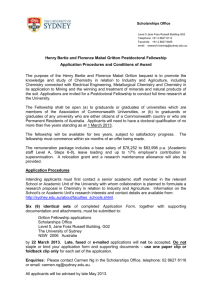Hedgpeth i Hedgepeth Christopher Hedgepeth Mrs. E. Richardson
advertisement
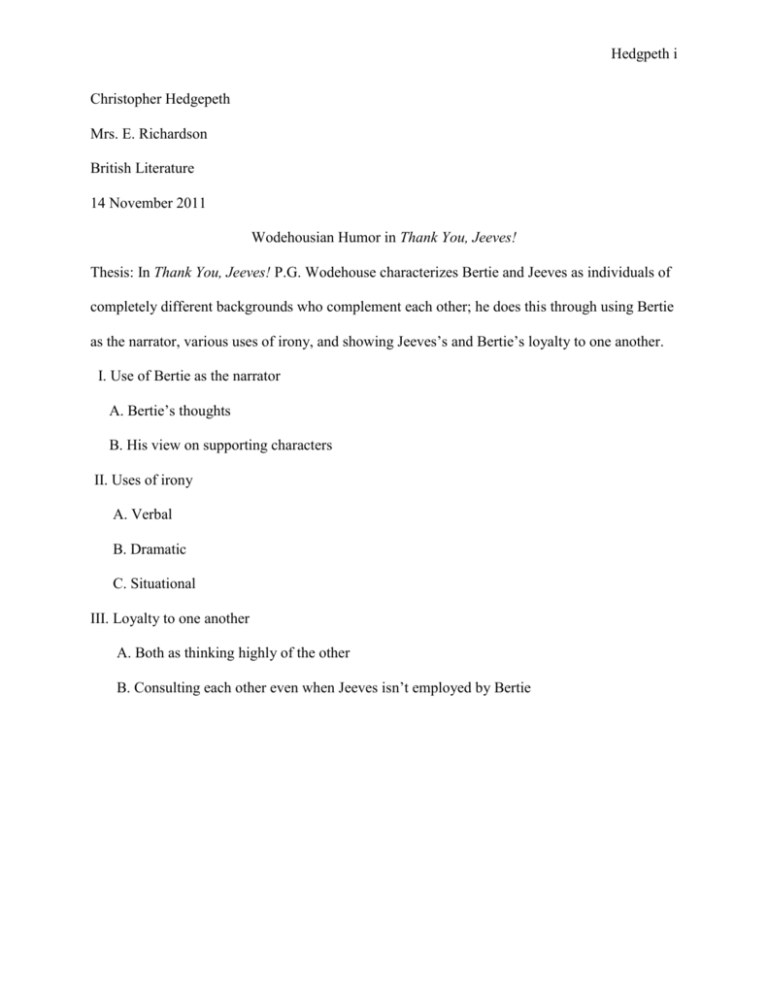
Hedgpeth i Christopher Hedgepeth Mrs. E. Richardson British Literature 14 November 2011 Wodehousian Humor in Thank You, Jeeves! Thesis: In Thank You, Jeeves! P.G. Wodehouse characterizes Bertie and Jeeves as individuals of completely different backgrounds who complement each other; he does this through using Bertie as the narrator, various uses of irony, and showing Jeeves’s and Bertie’s loyalty to one another. I. Use of Bertie as the narrator A. Bertie’s thoughts B. His view on supporting characters II. Uses of irony A. Verbal B. Dramatic C. Situational III. Loyalty to one another A. Both as thinking highly of the other B. Consulting each other even when Jeeves isn’t employed by Bertie Hedgepeth 1 Christopher Hedgepeth Mrs. E. Richardson British Literature 14 November 2011 Wodehousian Humor in Thank You, Jeeves! In Thank You, Jeeves!, by Pelham Grenville Wodehouse, Bertram “Bertie” Wooster moves out of his home in London after people, including Jeeves, criticize his banjolele playing. Bertie releases Jeeves from his employment only to discover later that he has now been hired by Lord Chuffnell, the man who is allowing him to use his cottage. Through the adventures, many of which include the ex- fiancée of Bertie, Jeeves and Bertie seem be drawn to one another even though the ties of employment are not there. In Thank You, Jeeves! P.G. Wodehouse characterizes Bertie and Jeeves as individuals of completely different backgrounds who are complement each other; he does this through using Bertie as the narrator, various uses of irony, and showing Jeeves’s and Bertie’s loyalty to one another. Wodehouse tells the entire story through the eyes of Bertie Wooster. Bertie comes off at first as a sort of arrogant aristocrat who is reliant on his butler, who is smarter than his master. In the beginning of this book, Bertie repeatedly has to ask Jeeves for help with remembering facts during conversation. During a confrontation with Sir Roderick Glossop, Bertie leans back to Jeeves to ask, “What was it Shakespeare said the man who hadn’t music in his soul was fit for?” (Wodehouse 10). It appears that when he has his butler there to help him with intelligent matters, Bertie tends to rely on Jeeves, but later in the book when they are not bound by employment, Bertie seems to recall things that Jeeves has taught him. Pauline Stoker notices his apparent change in vocabulary since their last meeting when she says, “You did what? Where do you pick Hedgepeth 2 up these expressions?” after Bertie has complimented her saying, “I wish you wouldn’t talk like that. I always esteemed you most highly” (45).Since Bertie is able to recall these things which Jeeves has taught him, one sees how Bertie holds his former butler as someone who has made him a better person. M.A. Sharwood Smith notes that, “When Jeeves is around, Bertie turns to him for help. Jeeves is a walking reference book” (215). Bertie is drawn to Jeeves’s intellect. He learns from him many references that he uses throughout the book. Smith says, “Bertie is very fond of making literary allusions since he fancies himself as a writer” (214). Bertie is able to reference these many allusions but is sometimes unsure of the actual quote. When he is departing from the burning cottage, Bertie thinks to himself, “With a regretful sigh, I hopped hurriedly to the window, and the next moment I was dropping like the gentle dew upon the place beneath, or is it rain? I always forget. Jeeves would know” (181). All through the story, Bertie thinks or says things like “Jeeves would know.” One might be led to believe that he relies heavily on his butler, as much of his quotes come from Jeeves, but it is also understandable to think that maybe Bertie references Jeeves so much because he is fond of him. Bertie remembers—and almost praises— Jeeves through these extracts, and he acknowledges that Jeeves, in essence, offers a “completion” his own self. Jeeves demonstrates his affection for Bertie in a different way though. Bertie has a way of getting himself into a variety of troubles that Jeeves always gets him out of. Critic William Vesterman states, “That's what Jeeves seems placed on earth to do” (94). Vesterman goes on to write about how even though Jeeves has to save Bertie from himself, he never gets mad or resents it. Jeeves seems to be, in fact, fond of his (at the present time) ex-master. In Thank You, Jeeves! Pauline Stoker recalls to Bertie what Jeeves told her as he was lowering her down from the yacht: “I remember his very words. ‘Mr. Wooster, miss,’ he said, ‘perhaps, mentally Hedgepeth 3 negligible, but he has a heart of gold’” (91). Jeeves may seem to be slightly harsh with saying that Bertie is “mentally negligible,” but Wodehouse uses this to show how Jeeves and Bertie complement each other. They appreciate each other thoroughly. Jeeves appreciates Bertie’s heart, and Mr. Wooster is grateful for Jeeves’s mind and good assistance. According to Katariina Siironen, “Wodehouse used an ancient comic patter of the dumb master and his clever servant” when he was creating the characters of Bertie Wooster and Jeeves (54). Therefore, using Bertie as a narrator is ingenious comedy as audiences read from his point of view, seeing how he justifies all of his actions through his thoughts. Bertie’s attempts to do the right thing usually fail, especially if he does not take the advice of Jeeves. While staying at Chuffnell Regis, Bertie does not believe that his friend, Chuffy, will have the guts to propose to Pauline Stoker unless he has somewhat of a push, and since Bertie was once engaged to Miss Stoker, he is convinced that if Chuffy catches them kissing, it will immediately fire up Chuffy and give him the impulse to confess his love right then. Before he does it, Bertie believes his actions are justified when Jeeves says, “Jealousy is undoubtedly an extremely powerful motivating force, sir” (58). But after Bertie tells Jeeves that his is going to kiss Miss Stoker, Jeeves responds by saying, “Really, sir, I should not advocate…I consider that you would be taking a decided risk, sir. His lordship is in a highly emotional condition” (59). Bertie continues to try to justify his actions and decides that he is doing what is best for Chuffy, but his failure to take Jeeves’s advice leaves him to the predicament of Mr. Stoker walking in, instead of Chuffy. All this confusion leads to an even more difficult situation when J. Washburn Stoker locks Pauline on the yacht and Jeeves has to save her. Jeeves and Bertie become one in Bertie’s thoughts. He trusts his own thoughts but normally takes the counsel of his crafty butler. Bertie always thinks highly of Jeeves and continually sees him as still a good friend even after they are not in an employment relationship. Hedgepeth 4 Critic Robert A. Hall, Jr. in his analysis of the major comic characters in Wodehouse’s stories writes, “Jeeves and Bertie complement each other completely, appearing together in almost all their stories” (32). Bertie’s thoughts allow the audience to see how much Jeeves actually complements Bertie, and vice versa. Bertie’s view of supporting characters seems to bring him even closer to Jeeves. After Bertie is educated by Jeeves, one could come to the conclusion that Bertie cannot be as entertained by his friends and others in Thank You, Jeeves! Bertie even goes as far as to start correcting his other friends’ grammar during their conversations. For example, when Chuffy is talking to Bertie, Chuffy says, “You have a perfect right to love who you like…” and Bertie interrupts, “Whom, old man,” (122). Bertie continues to sort of be proud of himself by thinking, “I couldn’t help saying. Jeeves has made me rather a purist in these matters” (122). At some points in the book, it appears that Bertie has started to view himself as higher than everyone else besides Jeeves. He seems to see everything as he has all the intelligence. When he finds Pauline in his bed, he warns her about his new man, Brinkley: “I must really ask you to use your intelligence” (94). As in most of Wodehouse’s stories, the supporting characters in Thank You, Jeeves! consist of a friend from one of Bertie’s old school, Chuffy; a young lady, Pauline; and a couple of antagonists who are there only to cause mayhem in Bertie’s life. Sir Glossop and Mr. Stoker could be considered the “less amiable characters” in this Wodehouse novel (Siironen 10). They are both sort of “nuisances” here because they both “represent some sort of threat to Bertie” (Siironen 10). These characters and Bertie do not see nearly eye to eye. Jeeves seems to always intervene in situations when Bertie is in a dilemma with these antagonistic characters. Although there are many distraction and troubles that get in the way of Chuffy’s and Pauline’s love for one another, they end up together anyway. Siironen speaks on the Jeeves and Wooster Hedgepeth 5 novels in general and writes, “The typically happy ending in these stories is the engagement of the young lovers, who are usually Bertie’s friends (10). Bertie has had his share of engagements too, in Thank You, Jeeves! it was Miss Stoker, but most of them have been misunderstandings or regrets. Even though Bertie has fell in love a number of times, he always “is able to escape this ‘fate worse than death’” (Siironen 10). Bertie is happy for all of his friends that get engaged in the end, but one should believe that Jeeves and Bertie complement each other so well that, perhaps, there is no need for a serious love in his life. Wodehouse uses a few different types of irony to emphasize how much Jeeves and Mr. Wooster complement one another. One situation where there is much irony in Thank You, Jeeves! is when Bertie receives an invitation to go for dinner on old Stoker’s yacht. Bertie says he only wants to accept the invitation so he can “get together with Miss Stoker and plead Chuffy’s cause” (145). At this point in the book, Chuffy and Pauline are frustrated with one another and have broken off their engagement after Pauline is found in Bertie’s bedroom. This situation is ironic, though, because when Bertie arrives, Pauline has been sent to bed for sneaking out the night before, and Mr. Stoker has only invited him there so he can keep Bertie as a prisoner aboard his yacht. Stoker wants Bertie to marry his daughter and it appears that Bertie will be kept prisoner until he does. Mr. Stoker is taking to Bertie about the marriage and differences between short marriages in the U.S. and Britain saying, “I believe you cannot simply go to the nearest minister, as in my country. These are formalities” (159). His use of verbal irony is humorous because Stoker tells Bertie, “While these are being attended to, you will, of course, be my guest. I’m afraid I can’t offer you the freedom of the boat” (159). The humor in this situation is that Bertie is told that he is a guest but can have no freedom, so he is essentially a mere prisoner under the will of J. Washburn Stoker. The only mistake that it seems that Stoker Hedgepeth 6 has made was that he hired Jeeves to be his valet and sent him to make Bertie “comfortable” while he was in captivity there. Bertie believes that everything will be fine since Pauline does not want to be wedded to him; however, Jeeves informs his old master that Miss Stoker “was also influenced by the thought that in contracting a matrimonial alliance with you, she would be making—shall I say a defiant gesture to his lordship” (162-163). Jeeves and Bertie complement each other by using these different types of ironies in various situations. Wodehouse is very clever and humorous in how he takes some of the old sayings and changes them through Bertie depend on the situation. In the case of the marriage, Bertie says, “You can lead a horse to the altar, Jeeves, but you can’t make it drink” (162). Although every character in this novel has his or her moments, irony in Thank You, Jeeves! is based mainly around one character: Jeeves. Siironen writes, “In the Jeeves & Wooster novels there is only one character that can be considered as somewhat ironical: Jeeves” (76). Siironen is not saying that Jeeves is the only character throughout the story that has ironic moments but that Wodehouse seems to characterize Jeeves as the only character in his novel that one could describe as a truly ironic character. Jeeves is a prime example of both situational and dramatic irony. He is never seen in Thank You, Jeeves! unless he is helping out others. Siironen confirms this when she writes, “He only appears in the scene when his services are required, the rest of the time his is either reading Spinoza or doing domestic chores” (76). Whenever Jeeves does arrive, though, he is always informed about everything that has happened. The irony in most situations throughout the book is that, most of the time, Jeeves is even more informed on things than our narrator is. During one of the beginning chapters in which Jeeves and Bertie are conversing about why Chuffy has not proposed to Pauling yet, Jeeves bring up the point that Chuffy does not believe he has the right to propose to a rich woman like Miss Stoker. Bertie responds by saying, “Besides, Hedgepeth 7 she isn’t as rich as all that. Just comfortably off I should say” (54). Jeeves corrects him, “No, sir. Mr. Stoker’s fortune amounts to as much as fifty million dollars” (54). This intelligent butler is a truly ironic character who complements his master very well. Bertie and Jeeves continually hold each other in the highest esteem. After Jeeves’s departure from Bertie’s employment, neither of them holds grudges nor has hard feelings for one another. Bertie very much wished that he could have kept Jeeves as his man servant, but Jeeves stayed persistent in his disliking of Mr. Wooster’s banjolele playing. One of the main passages in the book that the reader’s attention is drawn to is when Jeeves says that Bertie “has a heart of gold” (91).This shows that Jeeves truly thinks of his old master as a man who does everything with the best intentions. Because Thank You, Jeeves! is written entirely from Bertie’s point of view, one can only get a sense of how Jeeves feels about Bertie when one reads of another character telling Bertie about it. When Bertie finds out that Jeeves is under Lord Chuffnell’s employment now, he speaks with him on several matters and asks, “What would you advise, Jeeves?” (58). Siironen writes that “Jeeves is a butler whose mental capacities seem to have no limits whatsoever; he is like a walking dictionary, encyclopedia and a Handbook of Etiquette all put together” (8). Bertie know that his servant is more intellectually talented than he is. Even though Bertie “has been to Eton and Oxford,” Jeeves knows and can recall much more than he. These two characters of Wodehouse’s complement each other in how they can rely on the other to give good advice. They also can confide things in each other. Many of their conversations throughout the story consist of either Jeeves telling Bertie what he knows about certain situations or of Bertie voicing his emotions, or opinions, about others to Jeeves. This shows a certain level of trust that they share. Hedgepeth 8 Critic George Watson writes, “(Philip) Marlowe takes American English about as far as it can go without falling over the edge--even further, for example, than Ernest Hemingway ever took it--and Jeeves and Berrie Wooster are British to the point of absurdity and beyond.” Watson means that Wodehouse created Bertie and Jeeves to be the perfect couple. They perfectly complement each other because Wodehouse used an old comic pattern of the dumbed-down master and his cunning, smart servant. Wodehouse’s continuous humor through the entire book keeps the readers interested. He ingeniously uses Bertie as his narrator to describe how Bertie would see Jeeves and himself as complements to each other. Bertie’s sense of “Wooster pride” would not allow him to thoroughly admit to Jeeves being his great counterpart. Although the readers are able to see how Bertie thinks of Jeeves, the audience only gets the feeling that Jeeves considers his master a good person when either Jeeves tells Bertie or someone else recalls Jeeves saying something about it to them. Wodehouse’s use irony all through Thank You, Jeeves! is a humorous technique that revolves around one outstandingly ironical character: Jeeves. His main use of Jeeves as an ironical character is when he has Jeeves show up in most situations being more informed on matters than the narrator, his master. Still another use of humor, though, in this book is the author’s depiction of Jeeves and Bertie as acquaintances that remain loyal to one another and even rely on each other often. The thought of an aristocratic master almost holding is man servant on a pedestal is hilarious, yet Wodehouse executes this humorous method seemingly effortless. The research that numerous critics and writers have done shows that Bertie and Jeeves are the nearly perfect heterosexual couple. In Thank You, Jeeves! Wodehouse illustrates Bertie and Jeeves as characters with different personas and levels of education who are able to complete the perfect pair; he does this by his humorous techniques of using Bertie as the narrator, Hedgepeth 9 implementing different forms of irony, and displaying Jeeves and Bertie as people whose relationship goes beyond that of employment. Hedgepeth 10 Works Cited Hall, Jr., Robert A. The Comic Style of P.G. Wodehouse. Hamden, CT: Archon, 1974. Print. Siironen, Katariina. "Don't Tell Me You Got into the Wrong Room." University of Jyvaskyla: Department of English. 2000. Web. 14 November 2011. Smith, M.A. Sharwood. “The Very Irreverent P.G. Wodehouse; A Study of Thank You, Jeeves!” Dutch Quarterly Review 8 (1978): 203-EOA. ILL. 26 October 2011. Vesterman, William. “Plum Time in Neverland: The Divine Comedy of P.G. Wodehouse.” Raritan (2005): 92-113. Web. 14 November 2011. Watson, George. “The Birth of Jeeves.” Virginia Quarterly Review 73.4 (1997): 641-652. Web. 14 November 2011. Wodehouse, P.G. Thank You, Jeeves. Boston: Little, 1934. Print.

